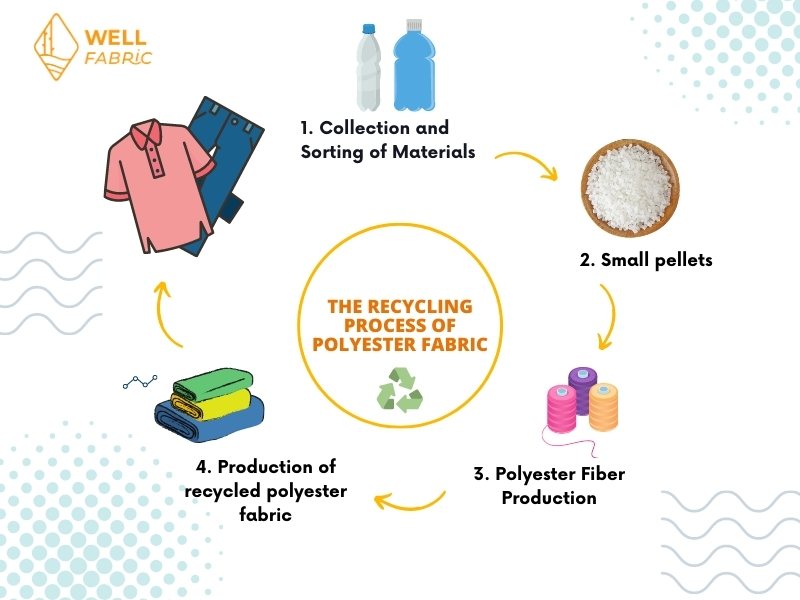The future of sustainable fashion: The Ecological and Social Value of Recycled Polyester and Organic Cotton
Abstract
With the improvement of consumers’ environmental awareness and social responsibility, The Ecological and Social Value of Recycled Polyester and Organic Cotton sustainable fashion has become an important trend in the global apparel industry. As two key environmentally friendly materials, recycled polyester and organic cotton are reshaping the future of the textile industry with their significant ecological advantages and social responsibility standards. This article uses 10 core arguments and data support to deeply explore the environmental benefits, certification systems, market demand and policy impacts of recycled polyester and organic cotton, and analyzes how FUSH˚ meets consumers’ demand for transparent and sustainable products through GOTS and GRS certification.
1. The pollution problem of the traditional textile industry needs to be solved urgently
Argument: Traditional polyester and cotton production causes great damage to the environment. Argument:
- Polyester fiber relies on petroleum extraction, and each ton of production emits 5.5 tons of CO₂ (Textile Exchange, 2023).
- Traditional cotton cultivation accounts for 16% of global pesticide use and seriously pollutes water and soil (WHO, 2022).
2. Recycled polyester significantly reduces carbon footprint
Argument: Recycled polyester reduces resource dependence and pollution. Argument:
- Compared with virgin polyester, recycled polyester reduces energy consumption by 59% (GRS report, 2023).
- Each ton of recycled polyester reduces carbon emissions by 20.7% and utilizes discarded plastic bottles (Ellen MacArthur Foundation, 2022).
3. Water-saving and ecological advantages of organic cotton
Argument: Organic cotton is more environmentally friendly than traditional cotton. Argument:
- Organic cotton cultivation reduces water consumption by 91%, and 80% relies on rainwater irrigation (GOTS, 2023).
- Production energy consumption is reduced by 62%, and toxic pesticides are banned (Textile Exchange, 2023).
4. Certification system ensures transparency
Argument: GOTS and GRS certification ensure material authenticity. Argument:
- GOTS requires at least 70% organic cotton and audits labor rights (GOTS Standard, 2024).
- GRS certification requires 50% recycled materials and covers full supply chain traceability (Textile Exchange, 2023).
5. Social responsibility is the core of sustainable fashion
Argument: Certified materials promote supply chain fairness. Argument:
- Both GOTS and GRS require compliance with International Labor Organization (ILO) standards and prohibit child labor and forced labor (ILO, 2023).
- Certified companies such as FUSH˚ need to regularly disclose supplier lists (FUSH˚ Social Responsibility Report, 2024).
6. Explosive growth in market demand
Argument: Consumers drive demand for recycled and organic materials. Argument:
- The organic cotton market is expected to grow 800% by 2028 (Industry Research Co, 2023).
- The recycled polyester market will reach $12.3 billion in 2027 (Industry Arc, 2023).
7. EU policies accelerate industry change
Argument: Regulations force companies to adopt sustainable materials. Argument:
- Germany’s Supply Chain Due Diligence Act (SCDDA) requires companies to disclose environmental and social risks (EU Parliament, 2023).
- The Digital Product Passport (DPP) implemented in 2025 will track the entire product life cycle (EC, 2023).
8. Brand certification enhances competitiveness
Argument: GOTS/GRS labels enhance consumer trust. Argument:
- 67% of consumers are willing to pay a premium for sustainable certified products (Nielsen, 2023).
- FUSH˚ orders increased by 40% after certification (FUSH˚ Annual Report, 2024).
9. Technological innovation drives cost optimization
Argument: Recycling technology reduces the cost of environmentally friendly materials. Argument:
- The production cost of recycled polyester has dropped by 35% compared with 2015 (McKinsey, 2023).
- The closed-loop recycling system enables the reuse rate of organic cotton waste to reach 90% (Circular Fashion Report, 2023).
10. Sustainable fashion is an inevitable choice for the future
Argument: Environmentally friendly materials will become the industry standard. Argument:
- 83% of fashion brands around the world have pledged to use sustainable materials by 2025 (Fashion Pact, 2023).
- The EU plans to ban non-recycled polyester by 2030 (EU Green Deal, 2022).
Summary
The Ecological and Social Value of Recycled Polyester and Organic Cotton Recycled polyester and organic cotton not only reduce environmental pollution, but also guarantee social responsibility through the certification system, becoming the key to the transformation of the fashion industry. With policy promotion and growing consumer demand, GOTS and GRS certification will become the core of brand competitiveness. Pioneers such as FUSH˚ have proved that sustainable fashion has both ecological value and commercial potential through supply chain transparency and technological innovation. In the future, environmentally friendly materials will no longer be an option, but an inevitable choice.
Keywords: The Ecological and Social Value of Recycled Polyester and Organic Cotton recycled polyester, organic cotton, GOTS certification, GRS certification, sustainable fashion, carbon reduction, EU policy, supply chain transparency, FUSH˚

